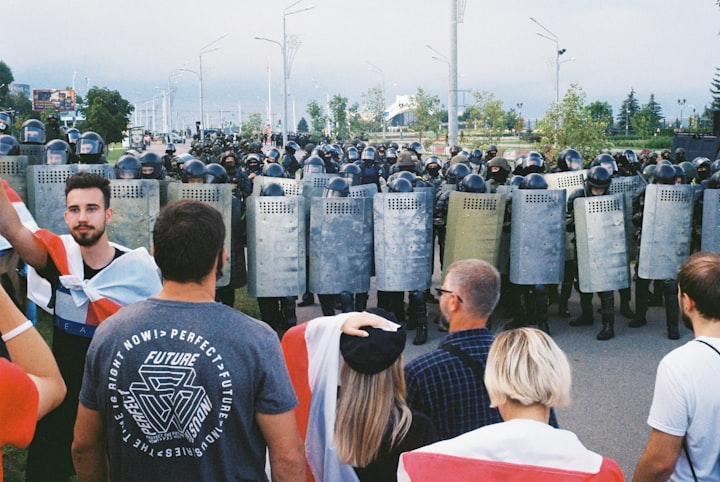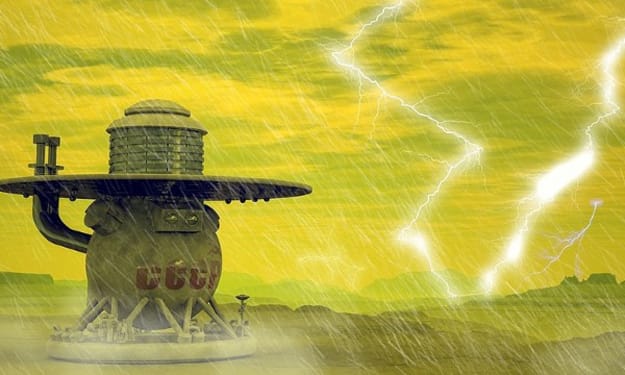How A Republic Dies: 11 Powerful Lessons From History That Will Open Up Your Eyes
What history tells us about the end of democracy.

“A Republic, if you can keep it.” — Benjamin Franklin
A small group of senators and other magistrates is holed up in the Capitol. Angry mobs are causing carnage outside, clamoring to get in. After several rounds of political violence, deadlock, and even death, things have gotten this far. The pressure is on, the stakes are high.
The year is 100 BC, and these events are unfolding in Rome. The mighty Roman Republic had been the most powerful country in the world for the past hundred years, its governmental institutions admired far and wide. Yet, something is starting to give.
The men who barricaded themselves on the Capitoline Hill were Saturninus, a senator and tribune of the plebs, and some of his followers. His former ally, Gaius Marius, the strongman of Rome and the repeat holder of the highest office in the Republic — the consulship, had been tasked by the Senate to capture the renegades and bring back order.
Knowing that they would not be able to hold out, Saturninus surrendered. Assuring them that their lives were going to be spared, Marius locked up the men in the building of the Roman Senate. A trial was to be set up. However, before that could happen, a mob of Saturninus’ opponents climbed the roof of the Senate building, took off the tiles and stoned the men inside to death.
This was the final act of an escalating cycle of violence that had pitted two movements against each other. Rome had become a divided society, with the Populares and Optimates duking it out for control. The Populares were promoting the causes of the lower classes, clamoring for the redistribution of land and public subsidies on basic goods. The Optimates were the law and order champions, sticklers for traditional values.
Saturninus was a Populare politician. He sponsored several bills that redistributed land to poor army veterans, subsidized grain supply, and promoted the rights of non-citizen Italians. Yet, all this was costly. When his opponent, Quintus Servilius Caepio, said that the Roman treasury didn’t have enough money to pay all these expenses, the momentum seemed to be swinging away from Saturninus.
His colleagues vetoed the grain subsidy bill. However, Saturninus decided to continue the voting in the Popular Assembly, which gathered the free citizens of Rome. To stop this, Caepio dispersed the crowd. The Senate tried to put a stop to the voting, declaring that thunder had been heard. Unfazed, Saturninus declared that if he wasn’t going to get his way, thunder was going to be followed by hail. Army veterans came in, and the Populare got his way.
However, despite this victory, Saturninus was starting to lose his power and influence. He needed to retain his office, and pack the other high offices with his allies, or he was done for. His staunchest ally, Glaucia, was running for the position of consul.
There were two consuls elected every year, but the field of people vying for the office was strong. Knowing that they were not going to win, the partisans of Saturninus and Glaucia beat one of the opposing candidates to death. This is what provoked the crisis of the Capitol, and led to the eventual deaths of Saturninus, Glaucia, and many of their allies.
It should have ended there, but it didn’t. This was only the beginning. These years experienced the opening salvos of a series of battles that eventually brought down the Republic. In 27 BC, the last man standing from a succession of civil wars, Octavian, became Augustus — the first emperor of Rome.
The lessons of history
History might not repeat itself, but it does rhyme. On the 6th of January, 2021, the Capitol building in Washington DC was stormed by a group of extreme supporters of outgoing US president Donald Trump. This is following an ever-increasing cycle of violence that has been exacerbated by the pandemic that hit the world in 2020.
In the last year, huge BLM protests have descended into mass lootings, destruction of property, and clashes with the police. On the other side, far-right armed groups have at times paraded themselves with guns, clashing with these far-left protestors. Armed groups have briefly intimidated the policymaking in Michigan, with some far-right fanatics even cooking up a plot to kidnap the governor of the state.
The political process seems to be descending quickly into mob rule. Not only is the US at the worst point of polarization since the Civil War in the mid-19th century, many people have stopped believing in the system. Instead, they are trying to institute change through the streets. Mob rule is quickly becoming the standard way of doing things.
Ancient Greek historian Polybius had observed that states go through political cycles. They start off as monarchies with one person having all the power, then oligarchies, and finally democracies. However, the idyllic period doesn’t last. Democracies often tend to backslide into mob-rule. Once this becomes unbearable, the cycle resets itself. One-man rule is the result. Polybius called this historical cycle “anacyclosis”.
What are the elements in the fall of a Republic?
This worsening of the political process and radicalization is something I have been observing for a long time now. After doing extensive research, at the beginning of 2019 I wrote a series of articles where I tried to analyze what is happening using the fall of the Roman Republic as an analogy.
In one article, I compared and contrasted the situation two thousand years ago in ancient Rome, with what has been happening now. At the time I wrote my piece the trends were worrying. Unfortunately, they have gotten much worse quicker than I had anticipated.
My goal with the article was to give out a warning. If things continue going the way they are, we are in for a rough ride. While doing the research, going through the primary sources from that period I discovered that there was a lot of wisdom that the ancient commentators, philosophers, and historians gave that could help today.
Using the analogy of the fall of the Roman Republic to serve as a warning sign for today is useful in several ways. It helps to clarify some of the processes that lead to such an event, but they also allow us a way to take a step back. Most people are full of cognitive biases, too hemmed in to their ideologies, and not able to rise above their pre-conceived notions when it comes to the political situation now.
However, maybe by showing the outcomes of something that happened in another society, they can be made aware of the irrationality of their positions. That could allow them to take a step back and adopt a more helicopter view of what they are doing. In the fall of the Roman Republic, there was no one correct side. All sides were to blame, and contributed to the carnage.
There are 11 main lessons that I have taken from the fall of the Roman Republic. These unfortunately still apply today.
Lesson 1: Large economic disparities can lead to grievances
“Thus certain powerful men became extremely rich and the race of slaves multiplied throughout the country, while the Italian people dwindled in numbers and strength, being oppressed by penury, taxes, and military service. If they had any respite from these evils they passed their time in idleness, because the land was held by the rich, who employed slaves instead of freemen as cultivators.” --from “Roman History” by Appian
Lesson 2: When a group of people feels that their lot in life has worsened and will keep on worsening, they might be susceptible to demagogues
“In general the whole plebs approved of Catiline’s undertaking, from an inclination for new things. In this it seemed to act according to its custom. For always in a state those who have no resources envy the propertied, admire evil men, hate established things and long for new ones, and from discontent with their own position they desire everything to be changed.” --from “The Conspiracy of Catiline” by Sallust
Lesson 3: Anger can lead to polarization, which is a step away from violence
“Some of the wisest of men have called anger a short madness: for it is equally devoid of self control, regardless of decorum, forgetful of kinship, obstinately engrossed in whatever it begins to do, deaf to reason and advice, excited by trifling causes, awkward at perceiving what is true and just, and very like a falling rock which breaks itself to pieces upon the very thing which it crushes.” --from “On Anger” by Seneca
Lesson 4: When people are not willing to compromise, the situation will get worse
“The dogmatists egotistically refuse to allow other people the judgment of the truth, but say that they themselves are the only ones to have discovered this.” --from “Against the Logicians” by Sextus Empiricus
“The fact is that those who are enslaved to their sects are not merely devoid of all sound knowledge, but they will not even stop to learn!” --from “On the Natural Faculties” by Galen
Lesson 5: When money and decadence become prevalent, society becomes ready to be seduced by simple (but wrong) answers to complex problems
“But a great majority of mankind, misled by a wrong desire, cry, “No sum is enough; because you are esteemed in proportion to what you possess.”” --from “Satires” by Horace
“Already long ago, from when we sold our vote to no man, the People have abdicated our duties; for the People who once upon a time handed out military command, high civil office, legions — everything, now restrains itself and anxiously hopes for just two things: bread and circuses.” --from “Satires” by Juvenal
Lesson 6: Human nature is the driving force of history
“Thus, out of multifarious civil commotions, the Roman state passed into harmony and monarchy. To show how these things came about I have written and compiled this narrative, which is well worth the study of those who wish to know the measureless ambition of men, their dreadful lust of power, their unwearying perseverance, and the countless forms of evil.” --from “Roman History” by Appian
Lesson 7: People are easily fooled
“Few men are controlled by reason, and few are pleased by a right purpose. The mob, rather, is led to what was plainly invented for oblivion of its cares. For it supposes that whatever serves its pleasure must also be linked to the happiness of the age.” --from “Various Epistles” by Cassiodorus
“The majority of the people are devoted only to their own interests and hate all their neighbors, regarding the others’ successes as their own losses and the others’ misfortunes as their own gains.” --from “Roman Histories” by Cassius Dio
“As Aesop says, we have two sacks suspended from our necks; the one in front is filled with the faults of others; the one behind is filled with our own. This is the reason why we see the faults of others but remain blind to those which concern ourselves.” --from “On the Passions of the Soul” by Galen
Lesson 8: People who put their personal ambitions above the common good are dangerous
“So much more intense is the thirst for fame than for virtue. Who’d embrace virtue simply for itself, if you took away all the reward? Yet nations have been destroyed by the ambition of a few, by their desire for fame and a title, a name that might cling to the stones that guard their ashes.” --from “Satires” by Juvenal
“”When his course brought him to the river Rubicon, which forms the boundary line of Italy, he stopped and, while gazing at the stream, revolved in his mind the evils that would result, should he cross the river in arms. Recovering himself, he said to those who were present, “My friends, to leave this stream uncrossed will breed manifold distress for me; to cross it, for all mankind.” Thereupon, he crossed with a rush like one inspired, uttering the familiar phrase, “The die is cast: so let it be!”” --from “Roman History” by Appian
Lesson 9: When those in power start going around the norms, you could be headed for a slippery slope
“It is such cases as these that sometimes perplex us in our consideration, when the point in which justice is violated does not seem so very significant, but the consequences of such slight transgression seem exceedingly important.” --from “On Moral Duties” by Cicero
“The assembly was broken up in terror. Neither laws nor courts nor sense of shame remained. The people ran together in anger the following day intending to kill Apuleius, but he had collected another mob from the country and, with Glaucia and Gaius Saufeius, the quaestor, seized the Capitol.” --from “Roman History” by Appian
“Ennius told us: “Rome’s Republic in its morals and people stands.”” --from “On the Republic” by Cicero
Lesson 10: It is very easy to destroy working structures, but it is extremely hard to build them back up
“Fortune is of sluggish growth, but ruin is rapid.” --from “Moral Letters to Lucilius” by Seneca
Lesson 11: A republic can fall slowly, one small action at a time
“Fools! You know not your doom: still you rejoice with one consent in madness.” --from “The Fall of Troy” by Quintus Smyrnaeus
What to do?
History can serve as a warning sign. However, the goal for us is now is to change the negative pattern before we are too far on the path to destruction. Luckily, ancient historians and philosophers have left a guide on how to improve things.
One way to do that is to go back to moderation and consensus making. Back in ancient Athens, the original lawgiver of that city Solon made it mandatory in times of strife for neutral moderates to join one party or the other. This would ensure that the extremists did not drive the discourse, and instead cooler heads would prevail.
Another idea is more on the personal level. Philosopher Hierocles the Stoic noticed that most people have very small circles of concern. The most important circle is drawn around themselves, then their family, then their group. These types of selfish divisions can only lead to chaos. Hierocles’s prescription was to widen your circle of concern. See the common humanity in everyone else.
“But the outermost and greatest circle, and which comprehends all the other circles, is that of the whole human race.” --from “On Appropriate Acts” by Hierocles the Stoic
Note: I published this article first here. It is based on a longer article comparing the fall of the Roman Republic to current times here.
About the Creator
Peter Burns
Peter is extremely curious and wants to know how everything works. He blogs at Renaissance Man Journal (http://gainweightjournal.com/).






Comments
There are no comments for this story
Be the first to respond and start the conversation.